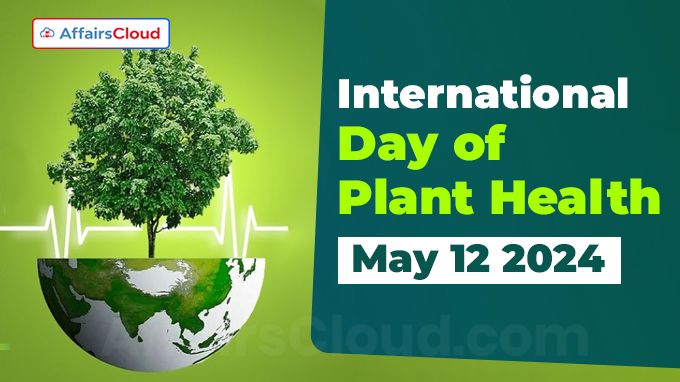 The United Nations (UN)’s International Day of Plant Health (IDPH) is annually observed across the globe on 12 May to raise global awareness of the importance of protecting plant health to end hunger and reduce poverty, protect biodiversity and the environment, and boost economic development.
The United Nations (UN)’s International Day of Plant Health (IDPH) is annually observed across the globe on 12 May to raise global awareness of the importance of protecting plant health to end hunger and reduce poverty, protect biodiversity and the environment, and boost economic development.
- 12th May 2024 marks the observance of the 3rd IDPH.
The annual observance of IDPH is led by the Food and Agriculture Organization of the United Nations (FAO) in collaboration with the International Plant Protection Convention (IPPC).
Theme:
The theme of IDPH 2024 is “Plant Health, Safe Trade, and Digital Technology”.
- The 2024 theme emphasises the significance of digital technology in monitoring and managing plant health effectively, ensuring food safety, promoting safe trade, and supporting sustainable economies.
Background:
i.On 29th March 2022, the United Nations General Assembly (UNGA) adopted a resolution (A/RES/76/256) and proclaimed the 12th May of every year as the International Day of Plant Health.
- The resolution recognised that plant health is key to the sustainable development of agriculture to feed the growing global population by 2050.
ii.The 1st ever International Day of Plant Health was observed on 12 May 2022.
Note:
i.IDPH emerged as a key legacy of the UN’s International Year of Plant Health (IYPH) 2020.
ii.The Year was extended until 1 July 2021 due to COVID-19 pandemic. Several key initiatives planned under the year were postponded due to the pandemic.
iii.The government of Zambia, with a proposal from its national plant protection organization, promoted the idea for IDPH on 12th May of every year.
Significance of Plants:
i.Plants provide 80% of the food we consume and produce 98% of the oxygen we breathe.
ii.Up to 40% of food crops are lost annually due to plant pests and diseases, impacting food security.
Threats:
i.Invasive Pests: International travel and trade spread plant pests, leading to biodiversity loss.
ii.Climate Change: Rising temperatures create new habitats for pests, increasing their spread.
iii.Pesticide Use: Increased pest populations lead to higher pesticide use, harming pollinators and natural pest enemies.
Key Facts:
i.Over 240 million containers carrying goods including plant products and 80% of international trade consignments with wood packaging pose biosecurity risks and pest transmission.
ii.Invasive pest species cause annual global economic losses of around USD 220 billion.
iii.Protecting plant health across borders is essential by promoting global collaboration and international standards like ISPMs.
- ePhyto (electronic phytosanitary certification) enhances trade security and efficiency.
2024 Events:
i.On 13 May 2024, FAO and IPPC organised a Technical Session (hybrid event) to commemorate the International Day of Plant Health under the theme “Plant Health, Safe Trade, and Digital Technology,” at Sheikh Zayed Centre, in Rome, Italy.
ii.Directorate of Plant Protection, Quarantine & Storage(PPQS), under the Ministry of Agriculture and Farmers Welfare, led the observance of IDPH 2024 in India.
- PPQS is responsible for plant quarantine in India. It also advises the Union and State Governments on plant protection matters.
- The PPQS has 73 plant quarantine stations at international airports, seaports, and land frontiers, with its headquarters in Faridabad.
About Food and Agriculture Organization of the UN (FAO):
Director-General– Dr. Qu Dongyu
Headquarters– Rome, Italy
Established in– 1945




